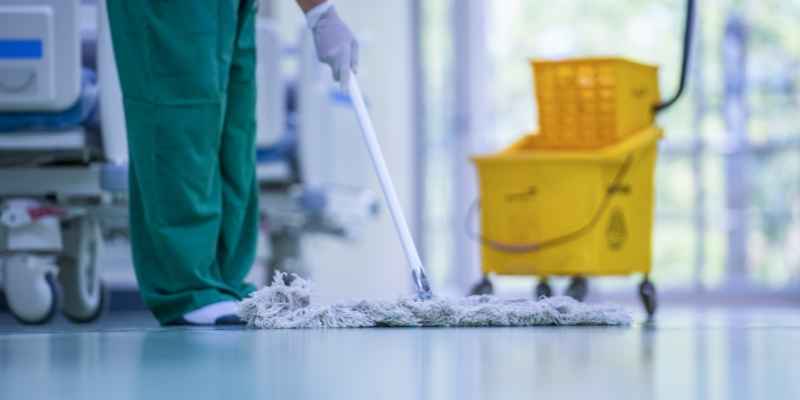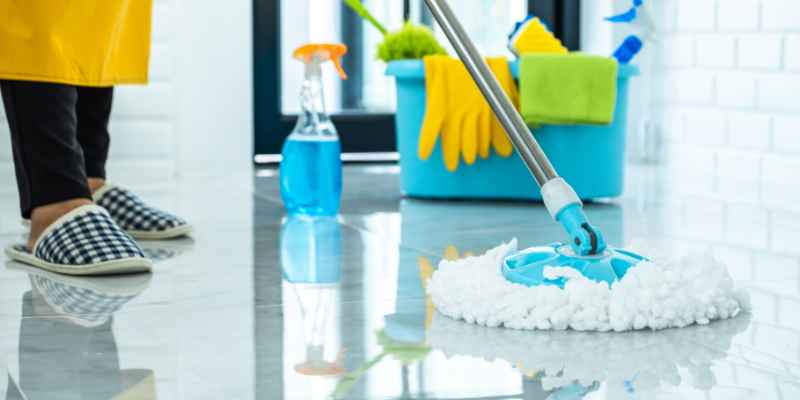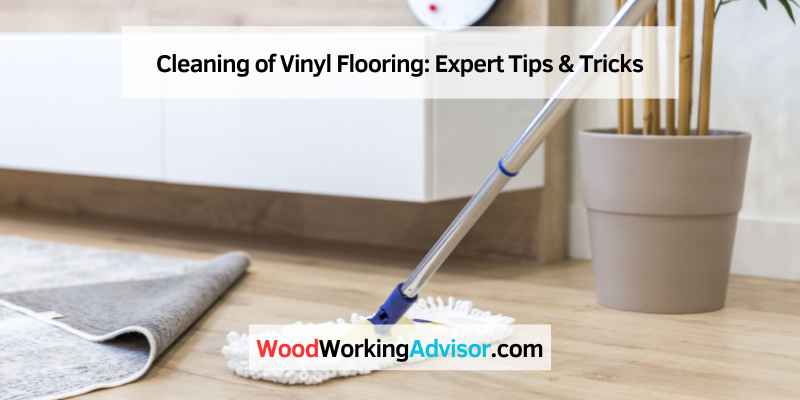To clean vinyl flooring, mix one cup of cider vinegar with a gallon of hot water and use a damp mop to apply to the floor while rinsing frequently with clean, hot water. Avoid using ammonia or ammonia-based cleaning solutions as well as steam cleaners on vinyl plank flooring as they can damage the vinyl.
Additionally, while vinyl is water-resistant, too much water can cause damage to the planks. Vinyl flooring is a popular and cost-effective flooring option for homeowners and businesses alike. It is durable, easy to maintain, and comes in a variety of styles and colors.
However, it is important to know how to properly clean and maintain vinyl flooring to keep it looking its best and to extend its lifespan. We will discuss the best methods for cleaning vinyl flooring, what cleaning products to use (and what to avoid), and how to prevent damage to your vinyl flooring.

Expert Tips For Cleaning Vinyl Floors
Learn how to effectively clean your vinyl flooring like a pro with these expert tips. Use a neutral pH floor cleaner, avoid steam cleaners, and never use wax or sealant. Mix one cup of cider vinegar with hot water to create a cleaning solution for extra cleaning power.
Vinyl floors are a popular choice for many households due to their durability and low maintenance upkeep. However, keeping them clean can sometimes be a challenge. In this article, we’ll share some expert tips for cleaning vinyl floors to ensure they remain in pristine condition for years to come.
Neutral pH Cleaners
It’s important to use a neutral pH cleaner when cleaning your vinyl floors to avoid potential damage. Avoid using harsh chemicals or acidic cleaners as they can cause discoloration and wear down the finish. Instead, opt for a neutral cleaner specifically designed for vinyl floors, which will effectively remove dirt and grime without causing damage.
Pro-tip for Drying LVPs Quickly
Drying your Luxury Vinyl Planks (LVPs) is essential to prevent water damage. For an effective and quick drying solution, use a damp mop and a fan placed on the floor, directed towards the wet areas. The fan will speed up the drying process significantly and prevent water from seeping into the subfloor.
Avoid Steam Cleaners
Although steam cleaners are often considered effective for cleaning surfaces, they can cause significant damage to your vinyl floors. The high temperature and excessive moisture from steam cleaners can cause warping and lifting of the vinyl planks. Therefore, it’s best to avoid using them altogether.
Avoid Wax or Sealants
Wax or sealant is often considered a useful method to protect flooring from scratches and stains. However, using wax or sealant on your vinyl floors can have the opposite effect. They can cause a buildup of dirt and grime that is difficult to remove, making your floors look dirty and dull. Instead, stick to a regular cleaning routine with a neutral pH cleaner to keep your vinyl floors looking their best.
In conclusion, cleaning vinyl floors is a simple task when you have the right tools and knowledge. By following these expert tips, your vinyl floors can look great for years to come. Use these tips and keep your vinyl floors shining!
Tools And Materials
Proper tools and materials are critical when cleaning vinyl flooring. Some of the best cleaners and solutions include neutral pH floor cleaners, Aunt Fannie’s Floor Cleaner, and Bona Pro Series Luxury Vinyl Floor Cleaner. Avoid using ammonia-based cleaners or steam cleaners as they can damage the flooring. Vinegar and water mixed with a few drops of liquid dishwashing soap are an effective combination for extra cleaning power.
When it comes to cleaning vinyl flooring, having the right tools and materials can make all the difference. Here are some of the best options to consider:
Bona Pro Series Luxury Vinyl Floor Cleaner
The Bona Pro Series Luxury Vinyl Floor Cleaner is a professional-strength solution that effectively cleans and removes dirt and grime from vinyl flooring. It is easy to use, pH neutral, and safe for use on all types of vinyl flooring.
Aunt Fannie’s Floor Cleaner Vinegar Wash
Made from non-toxic and biodegradable ingredients, Aunt Fannie’s Floor Cleaner Vinegar Wash is a natural and safe option for cleaning vinyl flooring. It effectively cleans and removes stains without leaving any residue.
Spray Bottle Hard Surface Floor Cleaner
The Spray Bottle Hard Surface Floor Cleaner is a convenient and easy-to-use option for cleaning vinyl flooring. Simply spray the cleaner on the floor and use a damp mop to wipe away dirt and grime.
Best Vinyl Floor Cleaner Liquid Armstrong Flooring Once ‘n Done
This vinyl floor cleaner is designed to clean and shine vinyl flooring without leaving any residue behind. It is safe for use on all types of vinyl flooring and is easy to apply and wipe away.
OdoBan Ready-to-Use Luxury Vinyl Floor Cleaner
The OdoBan Ready-to-Use Luxury Vinyl Floor Cleaner is a versatile, all-purpose cleaner that is safe for use on vinyl flooring. It effectively cleans and removes stains without leaving any residue behind.
Zep Neutral Floor Cleaner
The Zep Neutral Floor Cleaner is a pH-neutral cleaner that is specifically designed for use on vinyl flooring. It is easy to use and effectively cleans and removes dirt and grime without damaging the flooring.
More Luxury Vinyl Floor Cleaners
There are many more luxury vinyl floor cleaners available on the market, including the Vinyl Floor Polish Zep Wet Look Floor Polish, Quick Shine Multi-Surface Floor Finish, and Bona Stone Tile & Laminate Floor Cleaner. These options are all safe and effective for use on all types of vinyl flooring.
Conclusion
Overall, there are many great tools and materials available for cleaning vinyl flooring. Whether you prefer natural options or professional-strength solutions, there is something for everyone. By using the right products and techniques, you can keep your vinyl flooring looking clean and new for years to come.
Best Way To Clean Vinyl Floors
To clean vinyl floors, mix one cup of cider vinegar with a gallon of hot water and use a damp mop to apply to the floor. Rinse the mop frequently with clean, hot water from another bucket or your sink, and for extra cleaning power, add a few drops of liquid dishwashing soap to the water and vinegar mixture. Avoid using ammonia or steam cleaners on vinyl plank floors, as they can cause damage.
Vinyl floors are an affordable and low-maintenance option, but they still require regular cleaning to keep them looking their best. When it comes to cleaning vinyl floors, it’s essential to choose the right products and methods to avoid damage. In this article, we’ll focus on the best way to clean vinyl floors, with a special emphasis on using a mix of vinegar and hot water.
Mix of Vinegar and Hot Water
One of the most effective ways to clean vinyl floors is by using a mix of vinegar and hot water. To prepare this cleaning solution, mix one cup of cider vinegar with a gallon of hot water. You can use this solution with a damp mop to apply it to the floor, making sure to rinse the mop frequently with clean, hot water from another bucket or your sink.
The acidity of the vinegar helps to remove dirt and grime from the surface of the vinyl, while the hot water ensures that the grime is wiped away easily. This solution is also gentle enough not to damage the finish of your vinyl floor.
Add Liquid Dishwashing Soap for Extra Cleaning
For an extra cleaning power, you can add a few drops of liquid dishwashing soap to the water and vinegar mixture. The soap helps to break down any tough stains, making it easier to clean your vinyl floors thoroughly. Remember to rinse your mop frequently to ensure that you’re not spreading the soap around and to prevent any residue left behind.
Using harsh chemicals or abrasive tools can damage the surface of your vinyl flooring, leaving it vulnerable to cracks and scratches. Always use a gentle cleaning approach to protect and preserve your floors.
In conclusion, cleaning your vinyl floors regularly is crucial to maintaining their appearance and longevity. By using a mix of vinegar and hot water, you can achieve a clean and shiny vinyl floor without any damage. Follow these tips on the best way to clean vinyl floors, and you’ll enjoy beautiful and well-maintained floors for years to come.
Things To Avoid
When cleaning vinyl flooring, it’s important to avoid using ammonia-based cleaners or steam cleaners, as these can damage the vinyl and cause cracking. Instead, try mixing cider vinegar with hot water and using a damp mop to clean, adding a few drops of liquid dish soap for extra cleaning power.
Things to Avoid While Cleaning Vinyl Flooring
Vinyl flooring is becoming popular because of its durability and easy maintenance. Although it requires minimal effort, it is important to clean it properly to maintain its shiny appearance. However, using inappropriate cleaning agents and methods can severely damage your floors. Therefore, it is imperative to follow some rules when cleaning vinyl flooring. In this blog post, we will discuss “things to avoid” while cleaning vinyl flooring.
Avoid Ammonia-based Cleaners
Ammonia-based cleaners might give your floor a shiny appearance, but they can damage it in the long run. It can cause discoloration and even strip off the protective layer of the floor. Therefore, avoid using cleaners that contain ammonia.
Avoid using a Steam Cleaner
Steam cleaning is a popular method as it deep cleans your floors. However, steam cleaning is not suitable for vinyl floors. The heat and moisture from the steam can seep into the gaps in the flooring, causing it to peel or crack. Moreover, steam cleaning can also loosen the adhesive that holds your flooring layers together.
Avoid Too much Water while Cleaning
While cleaning your vinyl floors, avoid using excessive water. Over-wetting can cause water to seep through the gaps between the tiles and damage the adhesive. Additionally, too much water can cause swelling, bulging, or cupping of the floorboards. Use a damp mop when cleaning and dry it up immediately to avoid water from seeping through your flooring.
In conclusion, cleaning your vinyl flooring doesn’t have to be a difficult task. However, it is important to avoid the things mentioned above like ammonia-based cleaners, steam-cleaning, and too much water. By using the appropriate cleaning materials and proper methods, you can maintain the longevity of your vinyl floors.
Faqs
Cleaning vinyl flooring requires gentle handling and specific cleaning products. Avoid harsh cleaning chemicals that can damage the texture and color of the flooring. Instead, use a neutral pH floor cleaner, such as cider vinegar and water, to clean and maintain the vinyl flooring.
Swiffer Wet On Vinyl Floors
Vinyl floors are fantastic, but the thought of cleaning them can be overwhelming. Swiffer Wet is a popular cleaning product, but is it safe to use on vinyl floors? The answer is yes; Swiffer Wet is safe to use on vinyl floors. It is an efficient and quick way to clean and remove dirt, debris, and stains from your floors without excess water that the vinyl plank can handle. However, it is essential to note that too much moisture can damage the vinyl flooring, so make sure you avoid using too much cleaning solution even if it is diluted.
Why Is Vinyl Flooring Hard To Clean?
Vinyl flooring is popular due to its durability and water resistance, but it tends to accumulate dirt and grime that makes it look dull. The top reason why cleaning vinyl flooring can be problematic is because of its surface texture. Vinyl plank has a soft texture that easily traps dirt and debris, making it challenging to remove. Using the wrong cleaning product and tools can also make cleaning vinyl flooring hard. It would help if you used mild cleaning products and tools like a soft-bristled brush, microfiber mop, or vacuum cleaner to clean vinyl flooring adequately.

Frequently Asked Questions On Cleaning Of Vinyl Flooring
What Is The Best Thing To Clean Vinyl Floors With?
Mix one cup of cider vinegar with a gallon of hot water and add a few drops of liquid dish soap for extra cleaning power. Avoid using ammonia or ammonia-based cleaning solutions and a steam cleaner on vinyl floors. Too much water can cause warping and discoloration.
Do not use Swiffer wet on vinyl floors.
What Should You Not Clean Vinyl Plank Flooring With?
Don’t use ammonia or ammonia-based cleaning solutions on vinyl plank flooring. Ammonia can cause it to crack. Also, don’t use a steam cleaner as it can’t stand up to the intense heat produced by steam cleaning. Use a vinegar-water mixture or a vinyl floor cleaner instead.
Avoid using Swiffer Wet as it can leave a residue.
Why Can’t I Get My Vinyl Plank Flooring Clean?
Avoid using too much water or ammonia-based cleaning solutions, as they can damage vinyl plank flooring causing warping or discoloration. Never steam clean vinyl flooring as it cannot withstand both water and intense heat. Use a damp mop with a solution of cider vinegar and hot water, or a vinyl-specific cleaner recommended by the manufacturer.
Swiffer wet is safe for use on vinyl floors.
Can I Use Swiffer Wet On Vinyl Floors?
Yes, you can use Swiffer Wet on vinyl floors. However, make sure not to oversaturate the floor with too much water as vinyl flooring can become warped or discolored with excess moisture. Also, avoid using ammonia or steam cleaners that can break down the vinyl.
For optimum cleaning results, try mixing one cup of cider vinegar with hot water and use a damp mop with a few drops of liquid dishwashing soap.
Conclusion
Maintaining clean vinyl flooring is important to improve its longevity. Cleaning it on a regular basis is the key to keep the floors looking new and polished. Use neutral pH floor cleaners and avoid using steam cleaners, wax or sealant, and ammonia-based solutions, which can damage the vinyl flooring.
Instead, mix cider vinegar with hot water to add extra cleaning power. Avoid using a dripping mop that will create too much moisture on the vinyl planks leading to warping or discoloration, hence keeping it dry is essential. With these simple tips,you can maintain your vinyl flooring looking new and shiny for years to come.


